The scoop on sneezing and sniffling
You’re likely wasting your money on decongestants. You might really not know what you’re allergic to. And you could be starting treatment way too late. When you have allergies, you feel miserable day and night, so it’s important that you do all you can to feel better. Allergists weigh in on everything from hypoallergenic dogs (they don’t exist) to mattress encasements (use them) so you can use their tips to stop sneezing and sniffling.
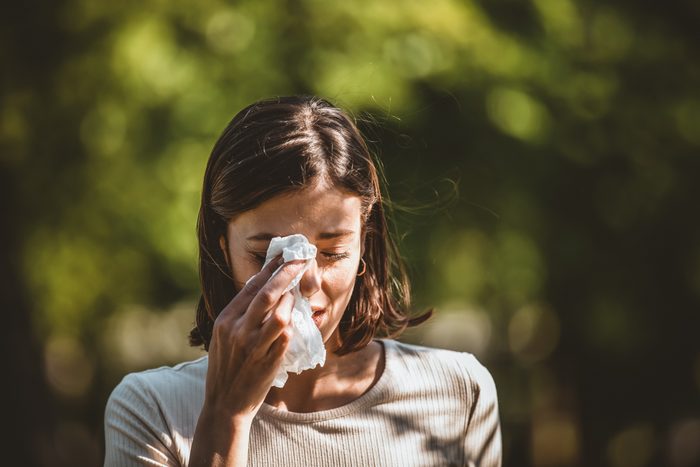
Is every year really “the worst one yet” for allergies? Possibly
“There’s admittedly some role of PR and marketing in that, but climate change does seem to be making allergies worse,” says Richard Weber, MD, past president of the American College of Allergy, Asthma and Immunology, and professor of medicine at National Jewish Health in Denver. “Allergenic plants are bigger and produce more pollen, and seasons are starting earlier and lasting longer.” This is what allergists do to keep their own allergies at bay.

Don’t assume you know what you’re allergic to
Two-thirds of people with any allergies also have year-round allergies to things like dust mites, mold, or pets, says James Sublett, MD, chair of the American College of Allergy, Asthma and Immunology Indoor Environment Committee and section chief of pediatric allergy at the University of Louisville School of Medicine. “You may assume you’re allergic to your cat, for example, but testing may reveal that it’s actually something else,” says Dr. Sublett. “Also, many people experience delayed reactions to allergens, which makes them harder to recognize. You could be outside mowing the lawn and sneeze a little bit, but experience more significant wheezing and coughing six hours later when you’re inside getting ready for bed.”

Some OTC decongestants may be a waste of money
Not all allergy medicine is created equal. “Over-the-counter decongestants without pseudoephedrine [the ingredient used to make crystal meth] have very little effect,” says Michael Blaiss, MD, clinical professor of pediatrics and medicine at the University of Tennessee Health Sciences Center and an allergist in private practice in Memphis. “Patients are basically getting ripped off. In terms of efficacy, you’re better off getting the ones you have to sign your life away for at the pharmacy counter.” Check out the 12 things pharmacists keep in their medicine cabinet.
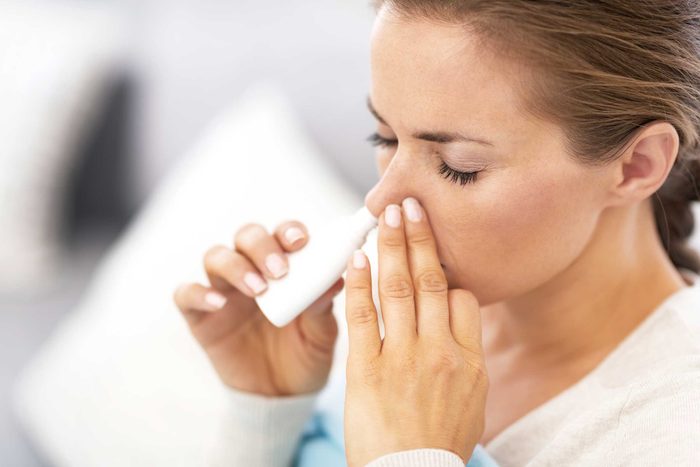
Antihistamines don’t work as well as you think
Oral antihistamines are the most common allergy medication, but prescription steroid nasal sprays work much better, says Dr. Weber. “People use the over-the-counter drugs so they don’t have to go to the doctor,” he says. Read what happens when you take too much Benadryl.

Make sure your medication treats your symptoms
There are so many over-the-counter allergy options now, people often diagnose and treat themselves. “So read the label and know what you’re getting,” says Michael Smith, MD, board-certified internal medicine doctor based in Atlanta. “For example, many antihistamines come in a ‘D’ variety, for decongestant. But if you’re not congested, don’t take this kind.” Here are 7 reasons you always feel stuffed up.

Allergy shots help a lot, but they’re not right for everyone
Allergy shots are great … for some people. “If you have only spring or fall allergies, allergy shots probably aren’t going to be worth your while. But if you have multi-season or year-round symptoms, they can help long-term with amazing results,” says Dr. Smith. Shots are also a major time commitment. For the first few months, you have to get them once a week then wait for 30 minutes to make sure you don’t have a reaction. These are weird things that can make your allergies worse.
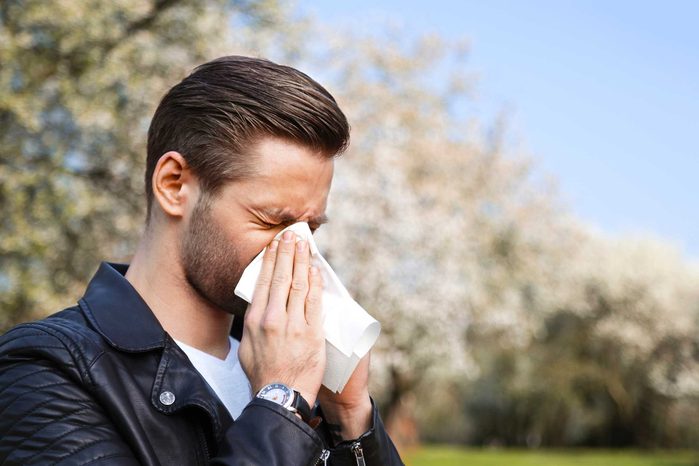
You’re starting treatment too late
If you know you have bad pollen allergies, start treating them even before you have symptoms, suggests Smith. “Watch the counts, and as soon as they start to rise, start taking your usual medication,” he says. “Once your body ramps up its release of histamines and inflammatory chemicals, they’re that much harder to treat.” Here are tips on how to pollen-proof your life.

You don’t want to hear this from me, but you may need to lose weight
Allergies and asthma are closely linked. Being overweight can make asthma and lower respiratory tract symptoms worse. “Overeating increases reflux, and tiny particles of acid can aspirate back into the lungs, causing irritation,” says Dr. Weber. “Another possibility is that acid in the lower esophagus damages nerve endings, which sends a message to the brain that also tightens your airways. And a physically large belly presses on the lungs, so they can’t expand as much. When patients lose weight, we can see their lung function is much better.” Here are 13 foods to help you lose weight.

If you tell me that you’re allergic to your pet, then I know you’re really suffering
People really love their pets. So if they tell their doctors their dog or cat is causing problems, symptoms are usually pretty bad, Dr. Weber says. “I would never tell someone to get rid of their pet, but keeping them out of your bedroom will make a big difference,” he says. “Also, get an air purifier with a HEPA filter. Pet dander tends to stay in the air longer than other allergens, so this is the one case where I feel a filter would actually be helpful.” Check out the best air purifiers for pets to keep your allergy triggers in line.
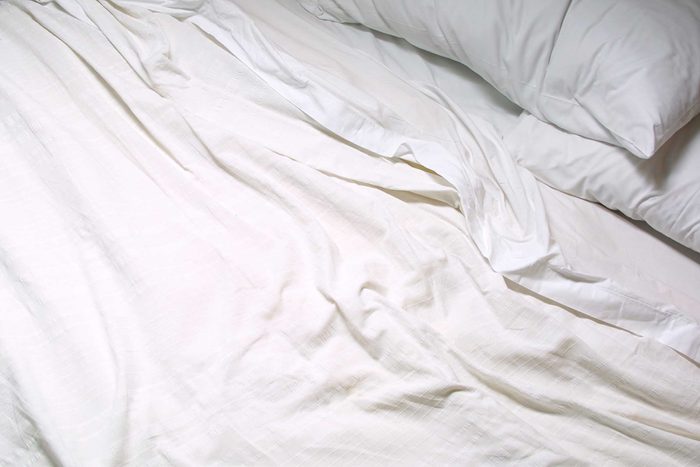
If you’re allergic to dust mites, use those bedding covers
Pillowcase and mattress encasings can help dust mite allergies, because they prevent mites from migrating in and out. “But make sure the packaging says how many microns the fabric is—the smaller the number, the tighter the weave and the more mites it will block,” says Dr. Sublett. He says the it should be at most 4 to 5 microns and ideally 2 or below. “If the product doesn’t tell you a number, I’d consider that a red flag,” he says. Here are some hypoallergenic pillows that allergists trust.
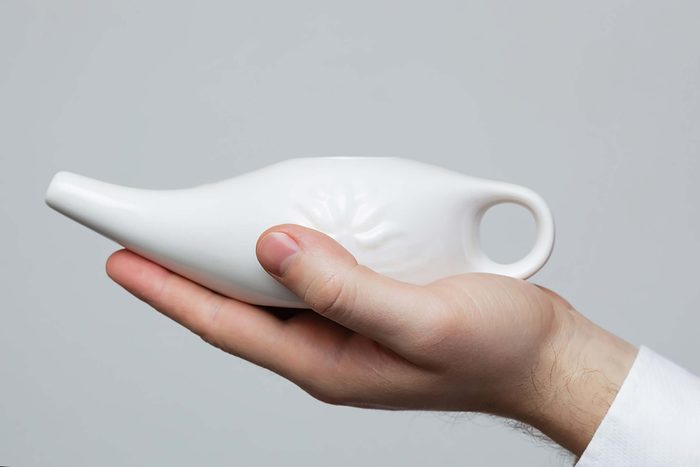
Neti pots are weird, but they work
A neti pot is a device you use to flush and moisten your nasal passages with a saltwater solution. Dr. Smith said he used a neti pot out of curiosity so he would know whether to recommend it to his patients. “It was a little scary at first, but now it works like a charm,” he says. “Many allergists like to use nasal irrigation themselves as a natural remedy.” Check out these 7 neti pot safety tips.
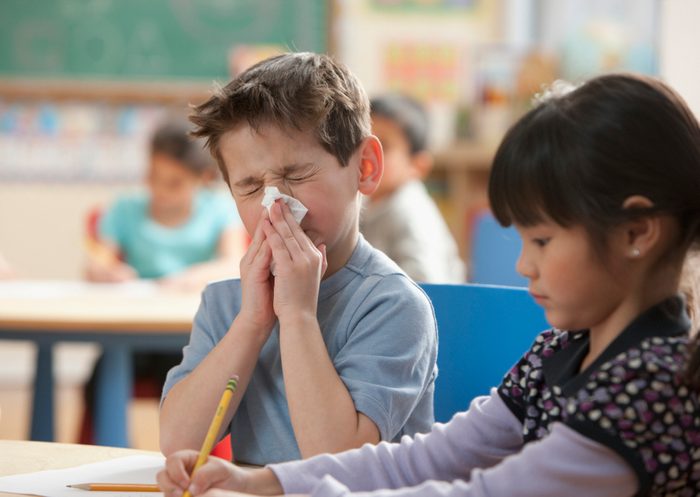
Your adult-onset allergies may have been around longer than you think
If you had recurrent chronic bronchitis as a child, it likely could have been asthma. “Adult-onset symptoms of allergies and asthma are more common today, but in some cases, you just didn’t recognize symptoms you had during childhood,” says Dr. Blaiss. Here are 11 questions to ask your doctor about childhood asthma.

They’re cute, but …
They might shed less or not at all, but there’s really no such thing as a hypoallergenic dog, says Dr. Smith. “Just because an animal doesn’t shed doesn’t mean it won’t cause allergies,” he says. “What you’re allergic to is the animal’s saliva or dander, not their fur.”

There’s no need to suffer through allergy season
Bad allergies can make you feel pretty miserable. “Leaving symptoms untreated can lead to sinus infections or ear infections,” says Dr. Blaiss. “I have patients who literally can’t fall asleep because their allergies are so bad. Don’t sit around waiting for symptoms to pass, because there are lots of treatment options out there.” Here are clear signs you have a sinus infection.

Don’t move across the country just because you have allergies
Allergies can happen to anyone at any time, at any age, and in any place. “I don’t want someone moving from Georgia to Arizona, only to start getting other symptoms there,” says Dr. Smith. “If you’re allergic to one kind of pollen, you’re more likely to be allergic to other kinds.” Try these trusted tricks to allergy-proof your home.

Your pillow could be a pile of allergens
You spend six to eight hours a day lying in a serious allergen hazard. “The longer you have a pillow, the more likely it will have a lot of dust mites inhabiting it, especially if you’re not doing anything to reduce the dust mite concentration,” says Joseph Dizon, MD, chief of service in the department of allergy and immunology at Kaiser Permanente-West Los Angeles. “Wash your sheets and pillowcases weekly in hot water, and dry them in the dryer. Many people aren’t aware it is important to wash your pillows on a regular basis. Doing this will not only reduce allergens, but it will also extend the life of your pillow.” Here are other tips to allergy-proof your home.
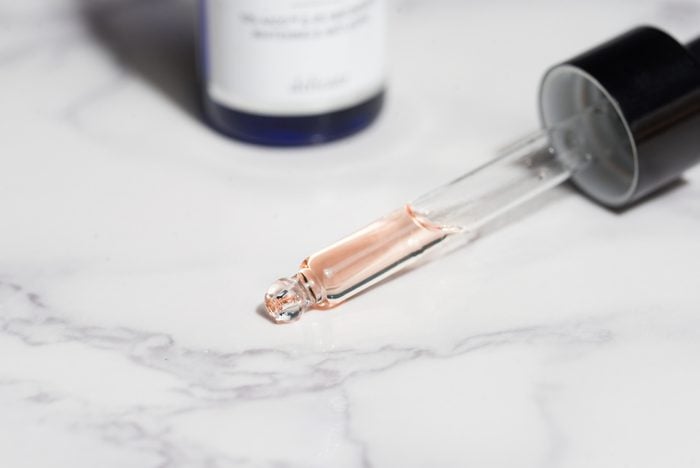
Drops may be better than shots for some
For decades, allergy shots were one of the few ways to treat chronic allergies. Today, however, another option is available—and possibly easier to use. “Many patients think that allergy drops do not work as well as allergy shots,” says Daniel P. Slaughter, MD, an ear, nose, and throat doctor at Sinus & Snoring Specialists in Austin, Texas. “Actually, studies have shown that allergy drops are as effective as allergy shots. They are also much easier for the patient to be compliant as they are done at home rather than a trip to the doctor. Allergy drops are also safer than shots as there is almost no risk of a severe allergic reaction to drop therapy.”
Karen L. Stierman, MD, an ear, nose, and throat doctor at the Allergy Center of Austin says you can buy some over-the-counter drops, but it’s best to talk with your doctor. “You may see ‘allergy drops’ in the store, but prescription drops are custom blended to your specific allergies to help you build up an immunity over time,” she says.

Skin and blood tests aren’t definitive
A rigorous allergy test can spot many possible allergy issues, but they’re not always the end-all and be-all of your allergy diagnosis. “Patients may have been told they ‘don’t have allergies’ because their skin or blood testing was negative. Actually, they may have local allergic rhinitis,” says Dr. Slaughter. “This is where they have true severe allergy reactivity isolated to their nose. It will not show up on testing but can still be treated with allergy drop therapy. In these cases, doctors can formulate the drops based on the patient’s history of allergy symptoms.” It’s possible that your heartburn is actually seasonal allergies.
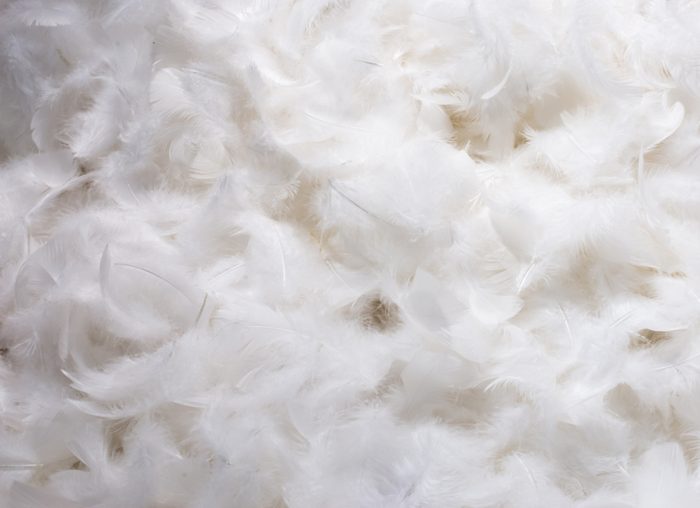
The material in your pillows matters
Allergy sufferers flock to synthetic fibers, but that may be a big mistake. “The type of pillow you use may play a role in causing allergies,” Dr. Dizon says. “Some studies have shown that synthetic pillows are more likely to cause issues with asthma than feather pillows. This is likely because the casings of feather pillows are more tightly woven to prevent feathers from coming out while synthetic pillow casings are more loosely woven and have more openings to allow for the migration of dust mites.”

Flowers aren’t the enemy
When tulips start to pop, many allergies head indoors, but those blooms may not be to blame for your sneezing woes. “Patients think that the springtime causes their allergies because of all the flowers blooming,” Dr. Slaughter says. “Actually, flowers typically don’t cause allergies. It’s the tree pollen that is blooming at the same time. The tree pollen is very small and lightweight and is highly allergenic for many patients.” Use these 11 tricks to stop seasonal allergies in their tracks.
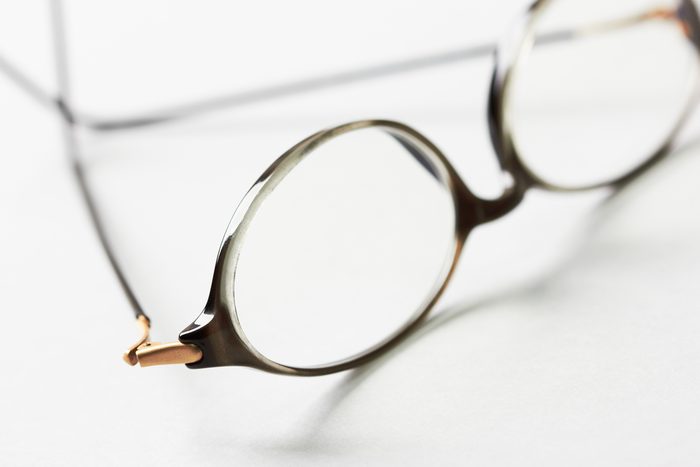
Swap contacts for glasses during peak allergy season
Watery eyes are an allergy hazard, but you may be making the situation worse. “I like to remind my allergy sufferers that there are certain little-known things that may be making their seasonal allergies worse. Contact lenses, for example, can trap pollen in your eyes, especially when the pollen count is high,” Jeffrey Frye, MD, area medical director for MedExpress. “You can imagine the painful, irritating itch that could cause. During peak allergy season, it can be helpful to opt for glasses, over contacts until the pollen counts return to normal.” It’s time to stop believing these 13 common myths about skin allergies.
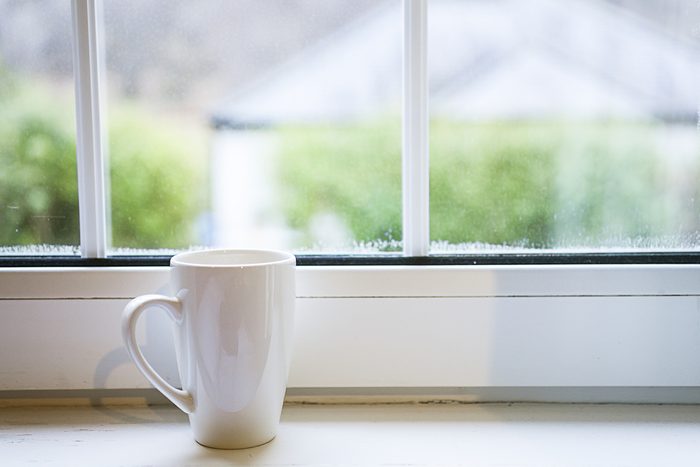
Plan to stay indoors in the mornings
“Pollen counts are highest in the early morning hours, so plan outdoor activities later in the day,” says Susan Schuval, MD, the chief of the division of pediatric allergy and immunology at Stony Brook University Hospital in Stony Brook, New York.
If you have to be outside, be aware of what’s in the air. “Listen to the pollen counts daily on TV during the weather report,” she says. “Meteorologists will tell you which kinds of pollen are in the air and the expected levels.”

Shower off to stop allergic reactions
Dr. Frye says many people do not realize that pollen and other allergens, like dust mites, aren’t just in the air. They attach to your clothes, your hair, your skin, your pillows, and bed sheets. “Showering at night can help rinse away the day—and the allergens—and will help prevent pollen from transferring to your bed sheets or other parts of your home, like couches, chairs, and carpets,” he says.
In addition to washing your body, you should wash your nose, Dr. Slaughter says. “Immediately after an exposure such as a run outside our cleaning the attic, the patient should do a saline rinse of their nose in the shower,” Dr. Slaughter says. “Getting out of the allergy-covered clothes and washing them is also very helpful.” Doctors share the 29 worst pieces of allergy advice they’ve ever heard.

Use herbal remedies with caution
Not all natural remedies are right for treating allergies. In fact, some may make them worse. “While some herbal medicines can complement allergy and asthma treatment, they can also trigger allergic reactions,” says Luz Fonacier, MD, head of allergy and training program director at NYU Winthrop Hospital in Mineola, New York. “For example, echinacea, which is often used to build immunity, is a distance cousin to ragweed and can spur allergy symptoms in those with a ragweed pollen allergy.” Let your doctor know of any herbal treatments you’re considering so you can look for overlap with your existing allergies. Check out these 14 medicinal herbs that you can grow.

Seasonal allergies can cause oral allergies
“Many of my hay fever patients describe to me problems eating apples in the springtime,” says Jon E. Stahlman, MD, FCAAI, section chief of allergy at Children’s Healthcare of Atlanta and part of the clinical staff at Gwinnett Medical Center in Lawrenceville, Georgia. “They get an itchy mouth, throat, or the sensation that their tongue is starting to swell. Usually, they stop eating many other fresh fruits or vegetables—bananas, cherries, avocado, carrots, celery—because they cause similar symptoms. Curiously, they can eat these foods if they are cooked.”
If you’re experiencing this, you’re not allergic to those foods, but you may still have to avoid them. “I usually explain to patients that their problem is related to their severe pollen allergies, especially if they are allergic to birch trees or ragweed. We call this oral allergy syndrome and it can be treated simply by avoiding the fresh forms of these foods,” Dr. Stahlman says. Here are 10 new solutions for seasonal allergies.
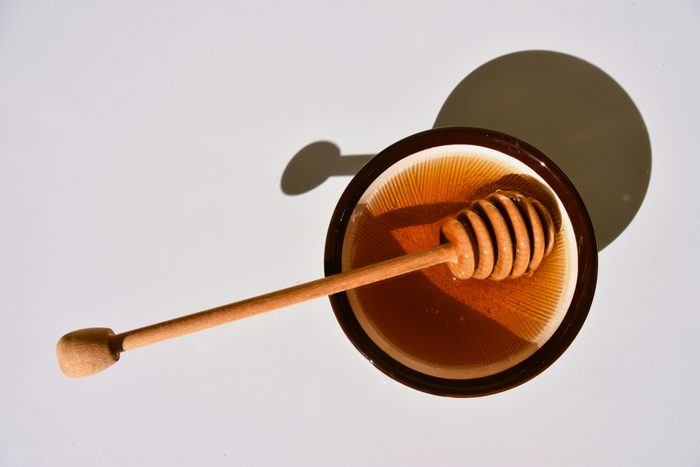
Honey may not be the DIY cure of your dreams
Spooning in honey to cure allergies sounds like an ideal allergy treatment, but it may be too good to be true. “Patients many times will use holistic approaches for allergy control. Raw honey is a treatment that many people will try,” Dr. Slaughter says. “People have the idea that raw honey contains all of the spring pollens and therefore a dose a day orally will teach the body to make blocking antibodies. Actually, studies have shown this is not effective because the honey mainly contains flower pollen, which isn’t allergenic for most people.” Find out about the 20 bizarre things you could be allergic to.

You won’t build up a medicine tolerance
Don’t be afraid to use allergy medicines if you need them. Your body won’t get used to them, despite the persistent allergy myth. “The majority of allergy sufferers—64 percent—believe that if you use one brand of allergy medication for a period of time, you can build up a tolerance and it will stop working,” says Neeta Ogden, MD, adult and pediatric allergist, asthma specialist, and immunologist in private practice in New Jersey. “Many allergy sufferers have also changed their allergy medication because of this perception. However, physiologically, it just isn’t possible. What’s more likely happening is that their allergy symptoms are getting more severe. The reality is that allergy season tends to get worse each year, so it’s more important than ever for allergy sufferers to manage their symptoms.”

Clean up your diet to ease allergies
“Eliminate all junk food, artificial colors, and additives that are in your food,” says Elizabeth Trattner, AP, NCCAOM, a licensed acupuncturist and integrative medicine practitioner. “Not only does this improve your immune system, but it helps avoid inflammatory chemicals that are hard to eliminate naturally from your body.”
Trattner suggests that eating a well-balanced diet of whole grains, organic, free-range animals, healthy fats, such as nuts and seeds, and get seven to 11 servings of fruits and vegetables will help you cope with allergies. “A proper diet keeps the immune system strong and healthy,” she says.
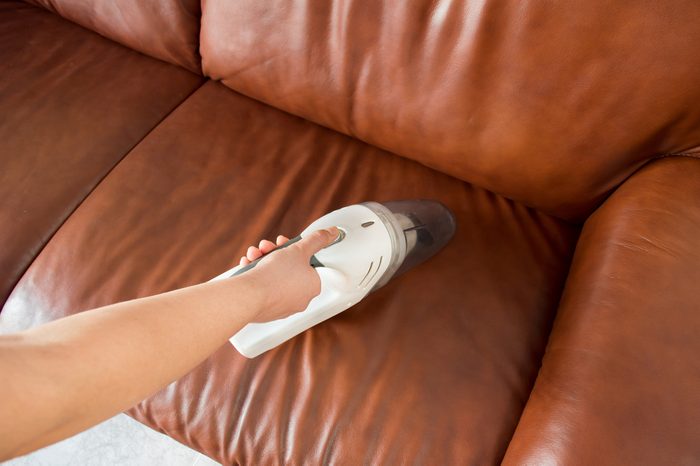
Use vacuums with special filters
Your carpets are filled with possible allergens. Vacuuming is a great way to eliminate them, but be sure to use a special filter or you’re just spreading the allergens around your house. “If you’ve got carpet, make sure to vacuum with a machine that has either a HEPA filter or special allergy containing bags,” says Andrew Engler, MD medical director for The Allergy & Asthma Clinic in San Mateo, California. “Otherwise you end up sucking distilled mites out of the carpet and blowing them all over the room.” These HEPA filter vacuums are great options for those with allergies.
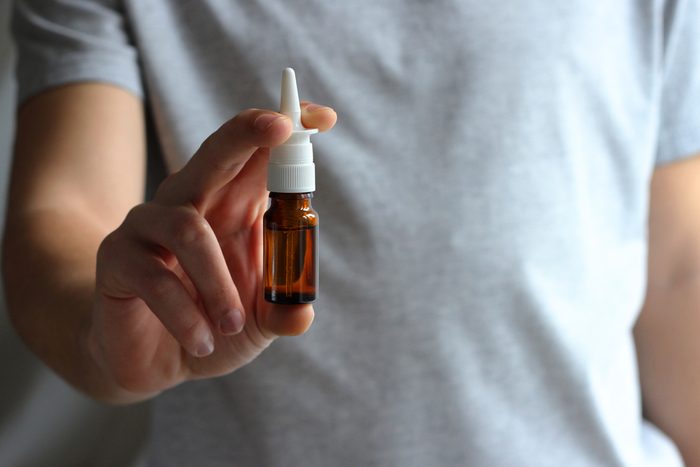
You need to take allergy medications daily
While you might think you only need allergy medicines when you’re having symptoms, newer medicines are designed to be used daily for prevention. “Most allergy medications work best when taken daily, and now there are a number of great options available over the counter without a doctor’s prescription,” Dr. Engler says.
Try multiple types until you find the one that works best for you. “Many allergy sufferers make the mistake of thinking that if you’ve tried one, you’ve tried them all. Fortunately, that’s usually not the case. However, make sure you are really trying a new medication by checking the active ingredients—two brand-name products may contain the same active ingredient so read the labels carefully.” Next, find out the surprising triggers of allergies that aren’t pollen.
